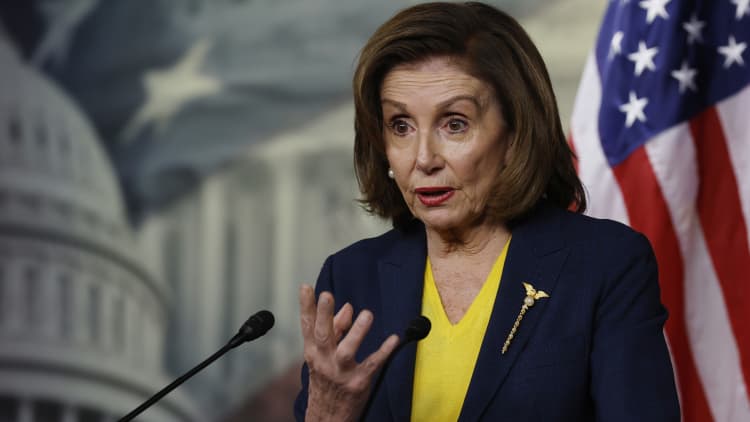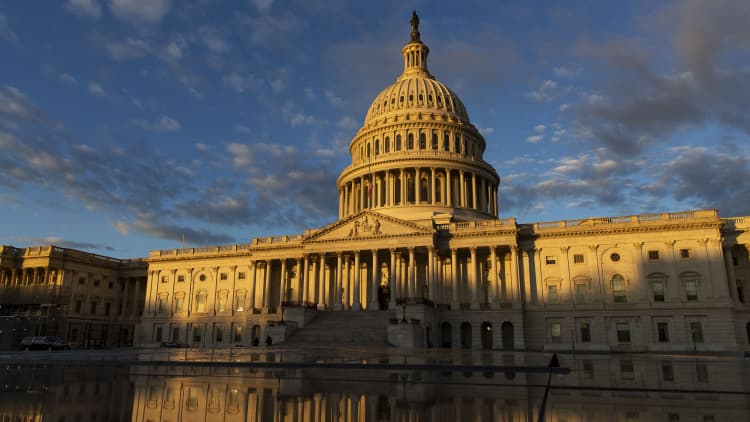
House Speaker Nancy Pelosi scoffed Wednesday at the idea of banning congressional lawmakers and their spouses from owning shares of individual companies, despite the possibilities for conflicts of interest between their legislative duties and personal finances.
"No," Pelosi, D-Calif., told reporters at a news conference where she was asked whether she would support such a prohibition.
"We're a free market economy," she said. "They should be able to participate in that."
Pelosi's dismissal of the idea of a stock purchase ban came in response to a question about a Business Insider investigative report this week on share ownership by lawmakers, and after controversies over stock purchases by a number of senators since the beginning of the Covid-19 pandemic.
The Business Insider series found that 49 members of Congress and 182 senior-level congressional staffers had violated the so-called STOCK Act, which requires public disclosure by themselves and family members within 45 days of sales or purchases of individual stocks, bonds and commodity futures.
The Stop Trading on Congressional Knowledge Act, which became law in 2012, is supposed to prevent lawmakers and staffers from engaging in trading on information they glean from their jobs, as well as conflicts of interest.
But violations of the STOCK Act, if sanctioned at all, usually result in fines of just $200.
"We have a responsibility to report" stock trades, Pelosi said Wednesday.
The speaker said she was not familiar with the findings of the Business Insider series.

"But If people aren't reporting [stock trades], they should be," Pelosi added.
Walter Shaub, former director of the U.S. Office of Government Ethics, blasted Pelosi's reference to the "free market economy" in the first of a series of tweets about the lack of a ban on stock ownership by lawmakers.
"It's a ridiculous comment!" Shaub wrote. "She might as well have said 'let them eat cake.' Sure, it's a free-market economy. But your average schmuck doesn't get confidential briefings from government experts chock full of nonpublic information directly related to the price of stocks."
In another tweet, Shaub wrote, "In an objective world, free of politics, members of Congress would be mocked for the absurdly weak ethics rules they've written for themselves."
In October, the Federal Reserve announced a wide-ranging ban on officials of the central bank owning individual stocks and bonds.
That ban came on the heels of the resignations of two Federal Reserve regional presidents, Robert Kaplan of Dallas and Eric Rosengren of Boston, after disclosures that they had traded individual securities in 2020. Their trades came as the coronavirus rocked markets, and while the Fed itself was engaging in massive purchases of assets aimed at keeping markets stable.
Lawmaker stock controversies
A number of good-government groups and some lawmakers have called for a ban on owning stocks, or mandating that members of Congress put their financial holdings in a blind trust while they are in office.
Allowing lawmakers to continue to own index funds, which track sectors of financial markets, is seen as one way to allow them to get investment returns while limiting the potential for benefiting from information they obtain about individual companies or being perceived as doing so.
In 2019, then-Rep. Chris Collins, R-N.Y., pleaded guilty to federal charges related to tipping off his son about nonpublic information he had obtained about a pharmaceutical company's failed drug trial, shortly before public disclosure of that information sent the company's stock into a tailspin.
Collins had for years beforehand touted the prospects of the company, Innate Therapeutics, and was on its board of directors even as he served in Congress.
Collins also was Innate's biggest shareholder in early 2016, owning more than 17% of the company, or almost 34 million shares. His children, Cameron and Caitlin, were at one point the third- and fourth-largest shareholders, respectively, with each owning 2.65% of the company at that time, or 5.2 million shares apiece.
Collins, who had been serving a 26-month prison sentence, was pardoned by President Donald Trump in December 2020, shortly before Trump left office. Collins had been the first member of Congress to endorse Trump's first run for the White House in 2016.
Last year, federal prosecutors investigated stock sales made in advance of a Covid-sparked market plunge by and connected to Sen. Richard Burr, R-N.C., Sen. Jim Inhofe, R-Okla., then-Sen. Kelly Loeffler, R-Ga., and Sen. Dianne Feinstein, D-Calif.
Those probes ended without criminal charges being filed.
But the Securities and Exchange Commission is conducting a civil investigation of whether Burr and his brother-in-law, Gerald Fauth, and Fauth's wife engaged in insider trading off of nonpublic information Burr obtained about Covid as part of his job. Fauth is chairman of the National Mediation Board, an agency that facilitates labor-management relations in the U.S. railroad and airline industries.
In August, Republican Sen. Rand Paul of Kentucky revealed for the first time in a disclosure report that his wife Kelly had purchased shares of drug company Gilead Sciences in early 2020, one day after the first U.S. clinical trial began for Gilead's remdesivir as a treatment for Covid-19.
Paul and his wife had not previously bought or sold stock in an individual company in the past decade.
Paul's disclosure was made more than 16 months after the legal deadline for reporting it under the STOCK Act had passed.
Like Paul, Tuberville made his disclosure after the expiration of the deadline set by the STOCK Act.


